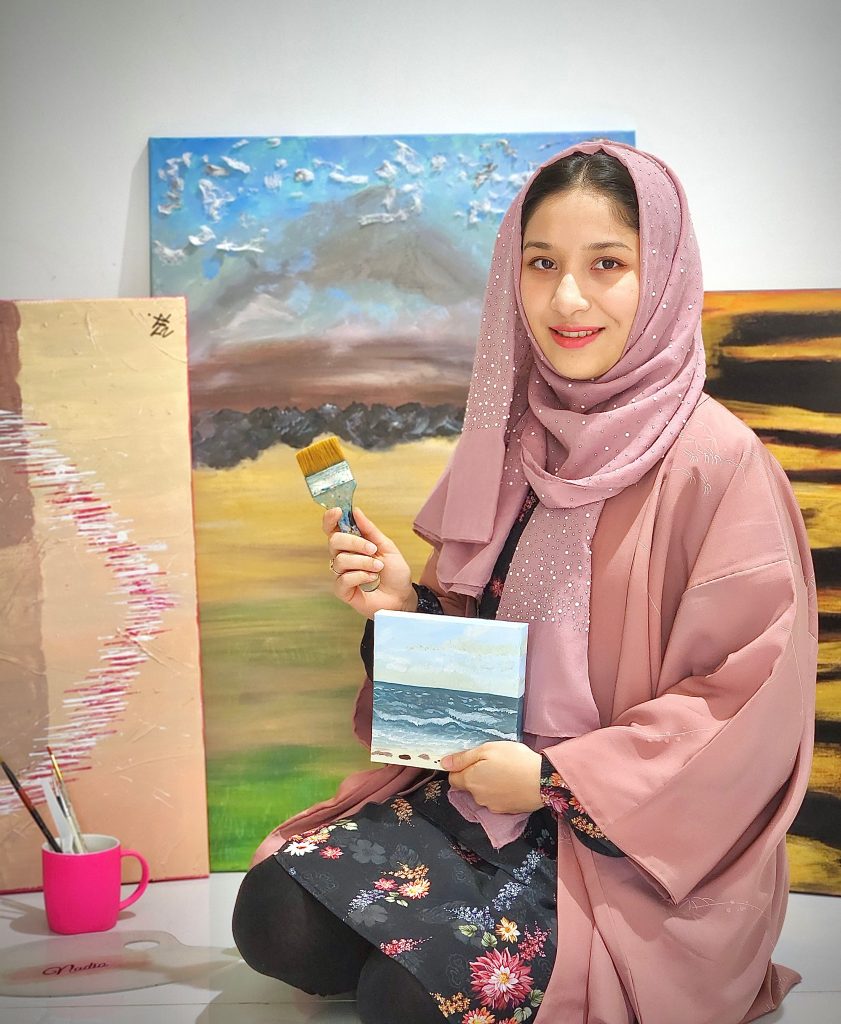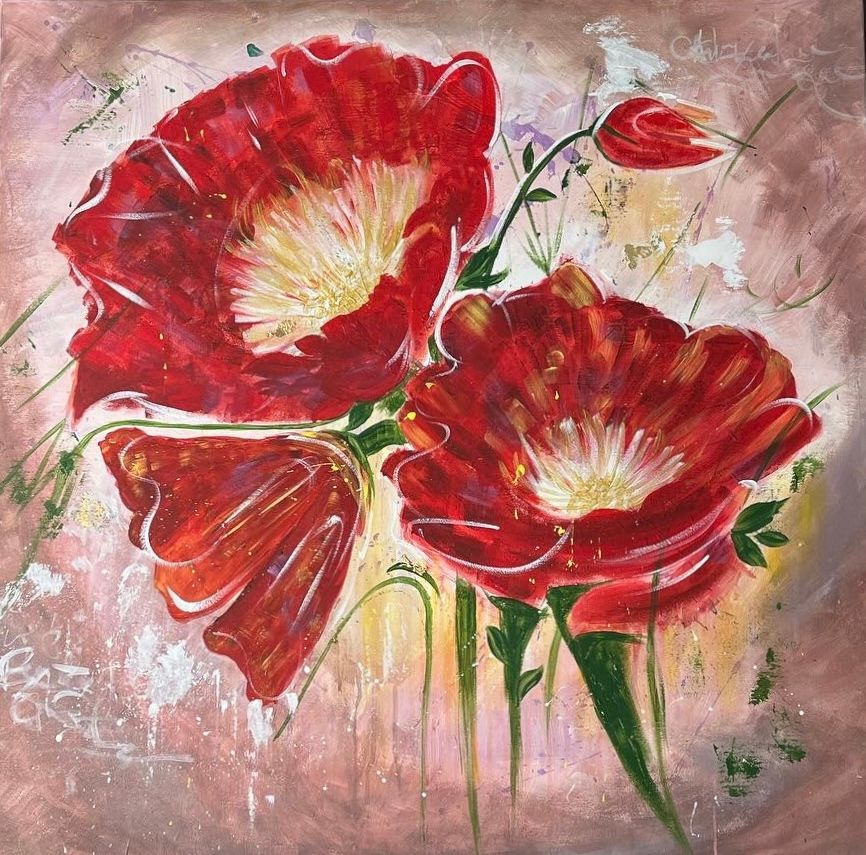DUBAI: Nadia Yoshioka is a Japanese Pakistani painter living in Dubai. Yoshioka has shown to be always good in the arts since childhood and has won the UAE inter-school painting competition. Her artworks have been exhibited in many places around Dubai, including university hospitals, hotels and malls.
She is currently displaying 9 paintings in her solo art exhibition at Radisson Red Dubai. Yoshioka has been represented by The Arabian Gallery, Gallery Vibes and Kawkab online gallery based in Dubai. Her art is sold to private collectors across the UAE.
Yoshioka believes that being an artist is something that one is born to do and not learned at school. She has taken online courses from various teachers on different painting techniques. She is now teaching private classes as well workshops where beginners learn from her while making the class fun and entertaining.
Yoshioka works primarily in acrylic paints and currently works from home where she has created her own little studio. She also takes custom orders as per client specifications.
She shared exclusively to Arab News Japan her inspiration for art: “As I have heard from the art world, most of us are born artists but only few of them aspire to actually become an artist in their adult life. In my case, I was the one to pursue art as my career despite of graduating in business school due to my passion for colors. I’m that person who doesn’t like plain and boring things and so I have been using colors since my childhood. I had a collection of coloring books and color pencils and I would not miss a day without coloring.”
“Moving forward to my school life, drawing, shading and coloring was something natural and easier for me than other kids in my class and I used to win contests without even trying hard. However, I didn’t respect it because it was something that my family and my surrounding would not really appreciate compared to getting good grades in other common subjects. Thus, I left drawing and art in general for a very long time until I started again in my university days when I joined the art club as my extra-curricular activity as well support from my friend who now is my husband”.

The picture shows Nadia Yoshioka, a Japanese Pakistani painter living in Dubai. (AN Photo)
“During that time, I used to only paint as a hobby and post on my art page as well as displayed my paintings in the university event. I barely had any inspiration on my own because I would not take it seriously and work on it. Later on, Covid came into everyone’s lives and due to lockdown, I had extra time to do my own activities which was art. I could not even do part time job and I was pushed towards making more paintings and it started selling after a while as well as was chosen for the exhibition at a five-star hotel which boosted my confidence and motivation to even make more. My inspirations began during lockdown period from my own experience, emotions and observations of other artists work around me as well online. I visited the exhibition to see other’s artworks and searched for ideas on the Pinterest app,” she added.
About the most inspirational thing from Japanese culture that she has adapted it into her daily life, Yoshioka said: “According to my observation of Japan, I would say the country is very cultured and still hasn’t lost it traditional aspect even after being modernized which I believe, that it keeps the country unique and gives it an identity. Furthermore, I really love the Japanese culture in general but I can say that being a half Japanese myself, I have adapted some of them in my everyday life. My first one would be to be kind to everyone and be humble as well respectful to people around me. I believe that Japan is today everyone’s bucket list country to visit and everyone loves it because of the respectful people in the country. Without those kind and generous people, the country would not be standing at the top position today. Secondly, is the healthy and balanced food of Japan. I like to have fish and seafood because I have been having them since childhood it keeps us warm and full for a longer time. I like to go out to have sushi with my family during the weekends. Furthermore, I cook Japanese food too at home including miso soup, onigiri, sushi, karaage, and much more.”

The picture shows one of the paintings of Nadia Yoshioka, a Japanese Pakistani painter living in Dubai. (AN Photo)
About the beginnings of her career in art, Yoshioka said: “I was an artist since childhood as I mentioned above but I started working as a professional artist since the Covid-19 period when I had the extra time to do something of my own. My concept about art is that it has to be vibrant and full of colors which has not only a subject but a feeling and emotion to the overall painting. Furthermore, the art should be self-expression and not a perfect picture which makes it unique and interesting to look at. Lastly, my concept for working on art is the right choice of colors to match the interiors and overall theme of the room.”
About the challenges that she faced during the projects that she worked on, Yoshioka said: “One of the challenges as an emerging artist is that, I’m still figuring out what my niche is like how renowned artists does. Due to this, I try different mediums, techniques and style often and most of the times, it would turn out good but sometimes it wouldn’t and all my time, effort and materials would be wasted. But I am not afraid of failure as it makes us grow.”
The first solo exhibition for Yoshioka has started this month at Red Radisson Dubai, she shared exclusively to Arab News Japan the theme and main highlights of her exhibition: “My new year’s resolution was to participate more frequently in art events whether in exhibitions or conducting workshops and this year started with a collaboration with the Radisson RED Dubai located in Dubai Silicon Oasis. It is the first millennial-focused hotel in the Middle which has funky interiors and bold designs aimed at younger travelers. They support local artists and talents of all kinds which I really love about. For this solo exhibition, I’m exhibiting 9 paintings where each wall has a different theme. One wall has two paintings that focuses on landscape, the other wall has two paintings that are in the theme of pink colors, the other wall has two paintings which are of bold contrasting colors and rest all has one painting dedicated to one wall”.
“I’m really grateful that my work has been chosen to be displayed on their hallways for the month of January. As a resident who lives nearby the hotel, it’s really great that they are supporting local emerging artists as it gave me the chance to share my skills and creativity as well as to build up a unique professional experience in the visual art world. Big thanks to the organizers of this event and Tabasum, Social Media Creative at Radisson RED Dubai who was very supportive throughout the entire process of the exhibition,” she added.
About her life in Japan, Yoshioka said: ”I was born and lived in Japan till I was 5 years old as both of my parents were working and living in Niigata city and then later Toyama city, I spend some of my childhood in Japan. I enjoyed my kindergarten time and also had Japanese friends and then all of a sudden, I remember myself in Pakistan when I was sent there so I can learn the Pakistan culture as well because I am half Pakistani. I used to go to Japan often so I don’t miss out the time in Japan as well. Later on, I and my family shifted to UAE and went to Japan many years later and then we went there last July.”
“The feedback that I would give about Japanese people is that they are very different than other countries as more than 90% are Japanese nationals over there and everyone speaks Japanese which I think that there could be room for English language over there so it is easier for people coming from outside to communicate. Other than the people in Japan were the nicest, kindest, hygienic, so helpful and also very respectful I have not seen anywhere else. Even though I didn’t look full Japanese and had difficulty with speaking fluent Japanese, I felt so supported and did not feel uncomfortable. Instead, it was so nice to see Japanese people after a while because I did not encounter any Japanese here in UAE and sometimes, I used to wish that I could have Japanese friends too,” she added.
Regarding her upcoming projects, Yoshioka said: “I have big plans for my future which I am slowly working towards. For this year and near future I have planned to do more exhibitions here in Dubai and also widen my activities to not only in one city but other cities as well. To participate in contests and any other artist open calls that may be happening in the country. To make more paintings in a series and sell them with great offers. To work on commissions. Also, to do giveaways and collaborate with bloggers and interior designers. Lastly, to do monthly painting workshops here in Dubai on my own or to join an existing workshop company.”
About her recommendations for those who wants to be an artist: “My recommendations for someone who wants to become an artist whether as a hobby artist or professional artist, is to never give up and keep trying to do what you love because it is a skill that no one can take away from you and at the end you will enjoy a lot to see yourself grown and achieved so much that you would have not expected or even believed.”
“So, believe in yourself and take the next step, be surrounded by positive people and vibes. Also, to not compare with the big artists because even though there are the best artists out there, the world still needs colors and unique designs and every artist and their artwork is unique, so keep creating without thinking twice. Most importantly enjoy what you do,” she added.












